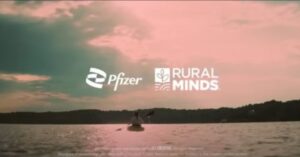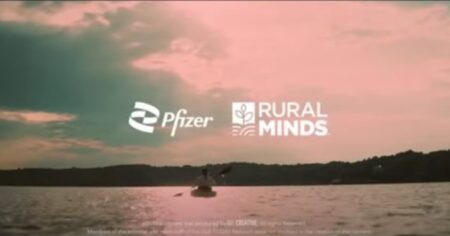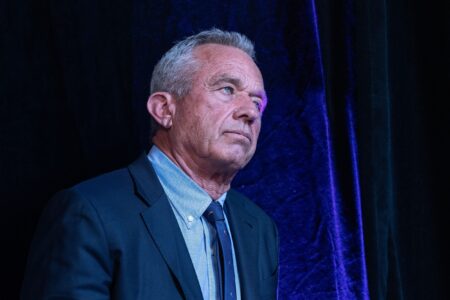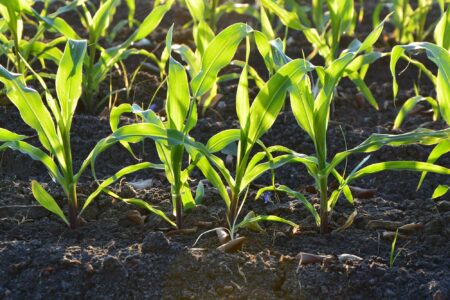Logan Lyon is a farmer from eastern Iowa, an ag risk manager and crop insurance agent, and a district director with the Iowa Corn Growers Association. He joined me for a conversation at Commodity Classic, where we talked about his travels on behalf of Iowa farmers and his famous butter-cow-sculpting grandmother, Norma “Duffy” Lyon.
Listen to the Podcast
Subscribe to 15 Minutes With a Farmer on Apple Podcasts, Spotify, or wherever you listen to podcasts. Please rate and review us!
Meet Logan Lyon
Growing up on a dairy farm gave Lyon an appreciation for hard work. Although he isn’t involved in the dairy industry today, those lessons serve him well as he balances family life, his day job, farming, and advocating for Iowa corn farmers.
Lyon has traveled around the world meeting with end users and sharing the story of American agriculture in his role with the Iowa Corn Growers Association and as a member of a delegation from the Iowa Economic Development Authority.
Although he is a successful member of the ag industry on his own, one of Lyon’s claims to fame is that he is the grandson of Norma Duffy Lyon, the Iowa icon who sculpted the beloved butter cow at the Iowa State Fair for 45 years.
Episode Highlights
- While in college, Lyon took part in the Iowa Corn Growers Association’s two-year I-LEAD career development program.
- Lyon farms 200 acres in eastern Iowa and works full-time in crop insurance. He and his wife farm with her parents and on their own.
- He has traveled on trade missions to South America, Japan, and Taiwan to meet with end users and promote American agriculture.
- One thing he learned in those travels is that a growth additive used in show pigs is affecting U.S. pork trade with Taiwan.
- Lyon emphasized how varied agriculture is — even within one state — and why policy needs to reflect that.
- On his own farm, Lyon is investing in tiling and other conservation practices to reduce erosion and increase sustainability.
- His grandmother, Norma “Duffy” Lyon, was Iowa’s iconic Butter Cow sculptor for 45 years.
Logan Lyon
I look for different balances in my life. So being able to practice what I preach on our farm specifically, being able to work with growers on the risk management, and [working with] the Iowa Corn Growers Association understanding kind of the policy, the background work, all the stuff that happens behind the curtains, hopefully to allow farmers to do exactly what they’re able to do without much extra oversight.
— Logan Lyon
Links and Resources
Transcript
Please note: This transcript has not been edited.
Lisa Foust Prater: Welcome to the 15 Minutes with a Farmer Podcast from Successful Farming, I’m your host, Lisa Foust Prater.
My guest today, Logan Lyon, sat down with me for a conversation at Commodity Classic. Logan is a farmer from eastern Iowa, an ag risk manager and crop insurance agent, and a district director with the Iowa Corn Growers Association.
In each episode, I have a quick 15 minute conversation with a farmer to hear their story and share their experience, expertise, and life lessons.
Logan, thank you so much for joining me on 15 Minutes with a Farmer.
Logan Lyon: Absolutely. Happy to be here.
Lisa Foust Prater: So you just mentioned that you are a brother to Lakaya Tenley, who I just recently had on the podcast.
Logan Lyon: Yes. Lakaya is my youngest sister. She’s eight years younger than me and super proud of what her and Tanner have been doing. And it’s been really cool to see their success. Yeah.
Lisa Foust Prater: So tell us about your life and your operation.
Logan Lyon: Yeah, so I grew up on a dairy farm just like my sister and when the cows left my senior year of high school, I had to kind of change plans. I was expecting to be some kind of livestock farmer my whole life. When the cows left I shifted gears and went to Ellsworth Community College and then Iowa State and got an agronomy degree.
So now I spend most of my time in row crop operations on my in-laws’ operation. They farm a handful of acres, then my wife and I have about 200 acres alongside of theirs. And then my full-time gig is farming crop insurance based out of Muscatine. So I connect with a lot of farmers on the insurance side and enjoy that quite a bit as well.
Lisa Foust Prater: Yeah, that’s such a good sort of piece of agriculture to be involved in. And not only to help yourself, but also like your other clients, that they understand that you’re a farmer too, and that you know kind of their backstory and what they need and how to help them with that crop insurance. That’s great.
Logan Lyon: Absolutely. Well, and I look for different balances in my life. So being able to practice what I preach on our farm specifically, being able to work with growers on the risk management, and then what brought me here today, the Iowa Corn Growers Association understanding kind of the policy, the background work, all the stuff that happens behind the curtains, hopefully to allow farmers to do exactly what they’re able to do without much extra oversight.
Lisa Foust Prater: Yeah, you know being on a board like that is so, it’s such a good experience just being involved with you know a commodity association. So tell me about how you wound up getting involved in that and kind of what that’s been like for you.
Logan Lyon: Yeah, I joke with the corn staff that I should be the poster child in a sense because they have a great collegiate advisory team to get people involved in Iowa Corn at the college level. They also have a leadership development program that’s a two-year program known as I-LEAD. I went through that in 2020 right before the pandemic. Right after I-LEAD there was a board position that opened up for my district in District Six and I rolled right into the board. So I’ve been all the stair steps — as involved as I can be with the Corn Growers Association for a long time since college.
So I’ve really enjoyed that and really been able to build great relationships with not only our staff who do a great job on behalf of Iowa corn farmers, but also the other board members. There are many seasoned farmers in that group that I can really dig into their opinions, understand what has been successful in their farm operations. So hopefully I can mimic that on mine.
Lisa Foust Prater: So tell me about any traveling that you’ve done with Corn.
Logan Lyon: Yeah, so a couple really neat ones. So in that I-LEAD program, we went to South America on a trade mission — Colombia, Peru, and Panama — and really learned how much grain we’re sending to South America. They have huge numbers of chickens there. That’s their cheap protein. So we toured a couple different chicken facilities. That trip really boosted my excitement for what our products in Iowa do for the rest of the world.
And then more recently, just in November, I went on a trade mission with the Iowa Economic Development Authority as the representation of Iowa Corn. We went to Japan, went to Taiwan, and again had conversations with major pork buyers over there — pork and beef buyers — so we can understand where our product ends up and toured many facilities there to figure out what they’re looking for in products so as a trade partner, we can continue to provide them the best products that fit their needs.
Courtesy of the Iowa Corn Growers Association
Lisa Foust Prater: Yeah, that’s so interesting. So when you were touring those farms in different countries like that, what are you seeing as far as differences and similarities to how we’re doing things here?
Logan Lyon: Sure. One of the main differences is cheap labor and how many more people they have, whether it’s on their labor force or staff. They have modern technology implemented but not near to the extent that we in the U.S. are trying to do from a labor standpoint. The cleanliness and their processes in Japan specifically were really unique — really clean and into high standards — so that kind of encouraged me to bring that back.
They’re not desperate for our goods, but they want our goods because they are truly better. But they also have great practices in their own countries that we need to pay attention to so we can compete well.
Lisa Foust Prater: Right, right. So I’m curious, just as you’re visiting these places, not only are you learning about how they do things, but they’re learning about how you do things. What kinds of misunderstandings do you see around the world about American ag?
Logan Lyon: In Japan it was really unique to talk through some of their concerns, but Taiwan’s a better example. They don’t import much pork from the U.S. because they outlaw Ractopamine (Paylean), which is used in show pigs to help put on weight. It hasn’t been common in commercial operations for years in the U.S., but show pigs still sometimes use it.
Even though show pigs are a small percentage, they test every imported load of pork into Taiwan. If there’s a positive — real or false — it causes trade issues. So it’s a challenge to communicate both ways: to help Taiwanese officials understand our practices, and to help U.S. producers understand the need to follow drug labeling strictly if we want access to certain markets.
Lisa Foust Prater: Right, right, right. I’ve always been fascinated by agriculture in South America — Brazil, Argentina, and beyond. The mass expanses of land, the opposite seasons, how that affects markets. It’s fascinating.
Logan Lyon: Yeah, South America continues to be a big pain as far as demand and trade goes. Their regulations are practically nonexistent compared to ours. Even simple things like emissions — a new John Deere tractor sold in the U.S. has emissions equipment. Same tractor sent to South America? No emissions system. That’s a $75,000 disadvantage for us.
Then there’s land use. Deforestation is actively happening there, while we’re widening buffer strips, planting cover crops, improving land sustainably. South America has more leeway to push the land harder, while American farmers face more obstacles — even though I think both sides want to do their best.
Lisa Foust Prater: Absolutely. Speaking of that, tell us what you’re doing on your farm as far as conservation and sustainability.
Logan Lyon: I’ve been involved in a couple different carbon programs for cover crops. It hasn’t been a huge influence yet, but I think those programs will grow. We’ve kept it simple: wide buffer strips, low-lying ground in grass to avoid erosion.
The biggest investment has been in tiling. If water can go below ground to its destination, we get it there. That reduces erosion, washouts, and improves how the ground farms.
Lisa Foust Prater: Yeah, tiling is huge. And just how varied things are in Iowa alone — I’m in central Iowa, you’re in eastern Iowa, then in southwest Iowa people irrigate. Just one state and it’s so different. What’s it like communicating to and for all those different types of corn growers?
Logan Lyon: Yeah, in my crop insurance work we talk about all of that — irrigated vs. non-irrigated, cover crops, nitrogen use. Our board is made up of farmers from all over the state, so at both the state and national level, everyone gets a voice. We work to represent all those voices and build policy that reflects their needs. And beyond just farming practices, every farmer is passionate about different things, which is why the associations matter.
If you’re a farmer and don’t feel heard, please show up to meetings or reach out. The goal is to amplify your voice and make sure your needs are part of the conversation.
Lisa Foust Prater: That’s great. And your wife grew up on a farm, too. You’re farming with your in-laws — how does that work for you?
Logan Lyon: We’re really fortunate. We live on the main farm, so it’s busy, but it works. They run their operation, I’ve got my full-time job, and I help when I can — weekends, busy season. It’s a great balance. We all try to grow opportunities for each other but also give each other space, because it’s family.
Lisa Foust Prater: That’s wonderful. It’s been so fun talking to you, Logan. And I love that it just happened that you’re Lakaya’s brother — I just talked to her and Tanner.
Logan Lyon: She stole my thunder on the butter cow thing.
Meredith Operations Corporation
Lisa Foust Prater: Oh yes! I have to ask — she just casually dropped that! Tell me a little bit about that butter cow situation.
Logan Lyon: So we can’t throw it out there quite as often as we used to. The generational connection to the butter cow has faded a bit. But yes — Grandma Norma “Duffy” Lyon did the butter cow at the Iowa State Fair for 42 or 46 consecutive years.
She wasn’t the original sculptor — there was a man before her. She was handpicked by an arts professor at Iowa State after entering a snow sculpting contest.
Lisa Foust Prater: No way!
Logan Lyon: Yeah, she sculpted a miniature Belgian team pulling a sleigh out of snow. The professor saw it and said, “You’re coming with me.” She was one of the first female vet majors at Iowa State.
Lisa Foust Prater: What an amazing woman.
Logan Lyon: Truly. She and my grandpa Joe ran a successful Jersey herd in the Tama-Toledo area. I think there are five statues across Iowa honoring her legacy.
Lisa Foust Prater: A total icon. It was always our number one stop at the fair. Logan, thank you so much. It’s been a pleasure.
Logan Lyon: Great show. Thank you so much.
Lisa Foust Prater: Thank you for listening. Please subscribe, rate, and review us wherever you listen to your podcasts. Open the latest issue of Successful Farming and visit us online at agriculture.com for more interesting features and news for your farm.


:max_bytes(150000):strip_icc()/Markets-5-Corn-dramatic-down-3-f3707c0b60a645ef9e7f826c6caf86f3.jpeg)




:max_bytes(150000):strip_icc()/Lyon_Profile-d082195a6a0449e0ab6066ac176177d0.jpg)


:max_bytes(150000):strip_icc()/Scouting-R5A_1597-012_corn-ae619e994b2945e9b40c76f7e4fbd2a8.jpg)

